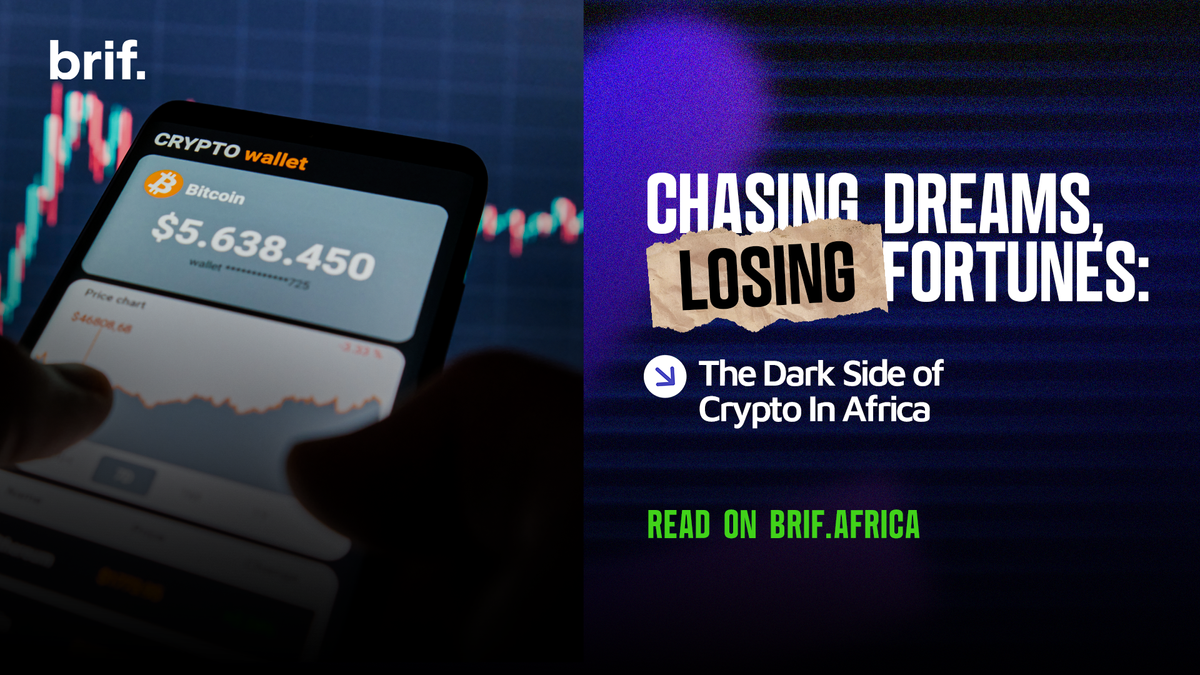Chasing Dreams, Losing Fortune: The Dark Side of Crypto In Africa
Once they gain your trust, they push you to invest more and more. By the time doubts arise, "Peekaboo!"

It started with a WhatsApp message. Kwame, a young professional in Takoradi, Ghana, read the text for the third time, heart pounding. “Earn $10,000 in just a month with our Bitcoin trading platform! No skills needed.” He screamed, "No way". It seemed too good to be true, but Kwame had seen his friend post flashy screenshots of "earnings." The perfect website, the testimonials, the WhatsApp group filled with happy investors, it all felt so real. Driven by dreams of financial freedom, he clicked the link. A month later, Kwame was left staring at an empty Momo account, his hard-earned savings vanishing into the abyss. He had been scammed.
And that Kwame was me.
This story is not unique. Across Africa, tales of overnight riches lure thousands into the dirty waters of cryptocurrency fraud. These scams, cloaked in the promise of economic transformation, have become a silent killer. But how did we get here, and why does the continent seem so vulnerable?
The Lure of Crypto Gold
For years, cryptocurrencies have been hailed as Africa’s financial revolution, a way to leapfrog traditional banking systems. It’s no surprise then that so many have embraced the technology, seeing it as a beacon of hope. While cryptocurrency offers the promise of financial inclusion and economic transformation, it has also given rise of scams.
Because where there’s hope, there’s also opportunism. Scammers, sensing the excitement, began spinning elaborate tales. They posed as trading experts, blockchain developers, and successful investors, weaving dreams so convincing that even the savviest individuals fell for them.
One such scam was the "MegaCoin" disaster in Nigeria. MegaCoin claimed to be Africa's first homegrown cryptocurrency, offering lifetime profits for early adopters. “Invest $500, and in three months, you’ll have $10,000,” they promised. The project gained traction through celebrity endorsements and flashy ads. By the time the website went offline, millions of dollars were gone, along with the dreams of thousands who believed they had struck gold.
According to Chainalysis, Africa’s cryptocurrency market grew by over 1,200% between 2020 and 2021, reaching a value of $105.6 billion.
Yet, this boom has also made the continent a hotspot for crypto fraud.
Why Crypto Scams Thrive in Africa
Africa is a land of untapped potential, where innovation often leaps ahead of regulation. The rapid adoption of cryptocurrency across the continent stems from its promise of bypassing traditional banking systems and empowering the unbanked. But this same promise has created fertile ground for fraud.
Lack of Regulation
Out of 54 African countries, fewer than 10 have clear policies on cryptocurrency regulation. Many African countries are still grappling with how to regulate cryptocurrencies. The absence of clear rules allows scammers to operate in a legal grey zone.
Low Financial Literacy
Cryptocurrencies are complex, yet many investors lack the foundational knowledge to understand them. Scammers exploit this gap, offering “simple” paths to wealth that mask elaborate schemes.
A 2022 World Bank report revealed that fewer than 40% of African adults have adequate knowledge of basic financial concepts. This gap is a goldmine for scammers.
Economic Pressures
With high unemployment and limited access to traditional financial systems, many Africans view cryptocurrency as a lifeline. This desperation makes them easy targets.
A Tale of Desperation and Greed
One time whilst surfing the internet. I found a story of a woman in Nairobi, Kenya. A single mother of two, faced with mounting school fees and bills. When she heard about a crypto investment group promising daily payouts, she saw a lifeline. “They even had a WhatsApp group where people shared their success stories,” She recalled. She borrowed $1,500 and invested it all. For few months, she received cool payouts, enough to convince her to put in even more. Then, the platform disappeared, along with her money.
And the rest was history.
This story echoes across the continent. The desperation to escape poverty, coupled with limited financial literacy, creates a fertile ground for fraud. Scammers exploit this vulnerability with precision, leveraging complex marketing strategies and even mimicking legitimate platforms.
The Anatomy of a Crypto Scam
Now, I want us to dissect how these scams work. Behind every crypto scam is a carefully crafted illusion, and this is how they operate. Let's go!
It always starts with the hook: A shiny website, professional graphics, and testimonials from supposed “investors.” Everything screams legitimacy.
Then the bait: The promise of high, risk-free returns. “Double your investment in 24 hours” or “Passive income while you sleep.”
Then boom 💥 into the trap: Once they gain your trust, they push you to invest more and more. By the time doubts arise, "Peekaboo!" the scammer vanishes, taking your money with them.
The Scams That Steal Dreams
If you know, you’re a step away from…
Ok. So these are some of the common scams that you might encounter if you've not encountered any yet. Lol
Ponzi and Pyramid Schemes: These scams promise high returns on investment, paid for by recruiting new members rather than generating actual profits. Examples include MMM and other schemes that collapsed, leaving thousands stranded, wiping out life savings in its wake.
In 2021 alone, Ponzi schemes accounted for over 90% of all crypto-related scams globally, according to CipherTrace.
Fake ICOs (Initial Coin Offerings): This is where "nice" stories are cooked. Fraudsters create fake coins or tokens, luring investors with compelling pitches and disappearing once they raise funds.
In 2018, investors lost an estimated $6 billion globally to fraudulent ICOs, with many victims in Africa.
Phishing Attacks: Scammers use fake websites and emails to steal private keys and access victims' wallets.
Pump and Dump Schemes: This happens a lot with meme coins. Scammers artificially inflate the price of a low-value cryptocurrency by creating hype, then sell off their holdings, leaving other investors with worthless tokens. And even some scammers create tokens with a one way entry, that is, you can only buy and can't sell them.
How to Spot a Crypto Scam
It’s easy to get caught up in the promise of wealth, but there are red flags to watch for:
Unrealistic Promises
If it sounds too good to be true, it probably is. No legitimate investment guarantees high, risk-free returns. Because of the volatile nature of Crypto, investing in it comes with some risk. So any investment platform that say otherwise is a...?
Alright.
Lack of Transparency
Scammers rarely disclose clear details about their team, technology, or business model.
Pressure Tactics
"Hey we're are offering a 50% extra bonus but you have to invest $X amount more. It ends in 3 days".
Yeah, so this is how they mount their pressure on you, huh? Fraudsters often push victims to act quickly, using fear of missing out as a weapon.
A Way Forward
Huh, enough talk right?
Now lets look at the way forward. The fight against crypto scams requires a collective effort:
Education is Key
Education - the key that opens lot of locks. Empowering communities with financial and digital literacy can prevent many scams. Knowledge is the first line of defense. You should know.
Building Trustworthy Systems
Governments and private entities must collaborate to develop secure, transparent crypto ecosystems.
Stronger Regulation
Policymakers need to create and enforce regulations that protect citizens while fostering innovation.
Community Vigilance
Reporting scams and sharing experiences can help prevent others from falling victims.
"Even with all these done, always remember to DYOR (Do Your Own Research) before you invest in anything."
Conclusion
The promise of cryptocurrency in Africa is undeniable, a beacon of hope for financial freedom, innovation, and inclusion. But with this promise comes danger, as scams threaten to erode trust in what could be a transformative tool for the continent. The question is no longer whether cryptocurrency will shape Africa’s future, but how Africans will shape the narrative around it.
Will we allow greed and deception to dominate, or will we rise above, armed with knowledge and vigilance? The responsibility lies with everyone - governments, innovators, and individuals, to ensure that the pursuit of wealth doesn’t come at the cost of dignity and security.
The glitter of crypto gold is exciting, but the path to true wealth lies in resilience, education, and a commitment to uncovering what’s real. As the continent navigates this digital frontier, it must do so with eyes wide open, knowing that the battle isn’t just against scammers but against the complacency that allows them to thrive.
"The future of cryptocurrency in Africa is unwritten. The pen is in our hands—how will we choose to write the next chapter?"
Thanks for reading till the end.
I'm Kingsford Nana Boadzi a passionate storyteller and a tech enthusiast.
I write | I speak | I create
I want to hear from you! Let’s connect and keep this conversation going.
Drop a comment or reach out—I’d love to hear your thoughts!





